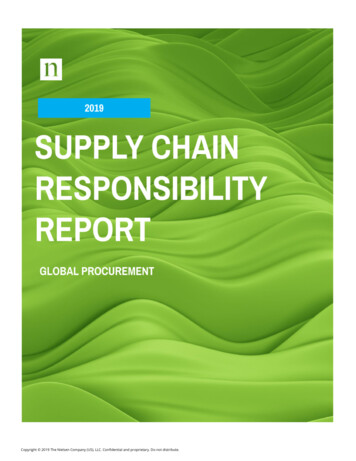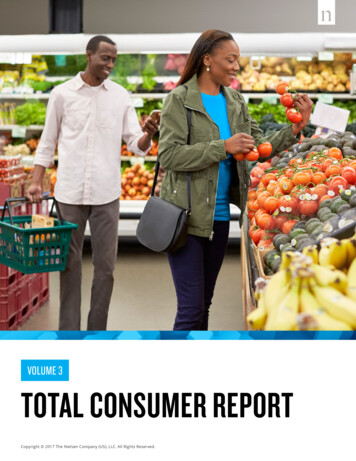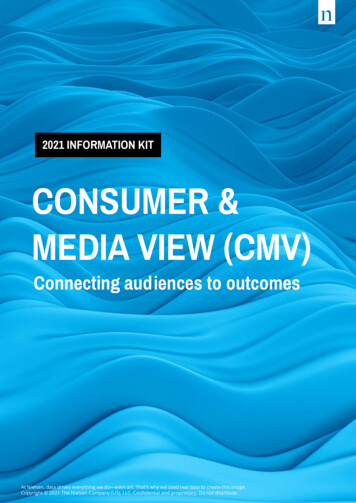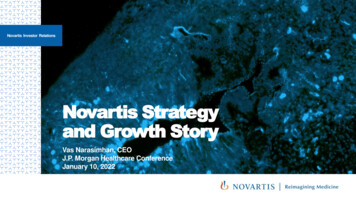
Transcription
Copyright 2019 The Nielsen Company (US), LLC. Confidential and proprietary. Do not distribute.
CONTENTSINTRODUCTION2HIGHLIGHTS 20162HIGHLIGHTS 20173HIGHLIGHTS 20184APPENDIX6RESULTS AGAINST 2017 GOALS6RESULTS AGAINST 2018 GOALS8Copyright 2019 The Nielsen Company (US), LLC. Confidential and proprietary. Do not distribute.1
SUPPLY CHAIN RESPONSIBILITY2019 PROGRAM REPORTINTRODUCTIONNielsen research shows that individual consumers increasingly value products and brands that promote sustainabilityand corporate responsibility. This consumer demand is driving companies to implement visible, responsible andsustainable business practices – business practices that include suppliers, end-consumers, employees andcommunities.Just like those individual consumers, corporate customers – our clients – are demanding more environmentally andsocially responsible practices and products from their suppliers.Our commitment to become a better supplier to our clients is a major driver for our sustainable purchasing efforts.In addition to our commitment to become a better supplier to our clients, there’s another reason why supply chainsustainability is important to us – it’s consistent with how we at Nielsen view the world and our place in it.Following is Year 3 progress of Nielsen’s supply chain sustainability program within the context of our initial 3-YearPlan. An unanticipated focus of our efforts in Year 3 was the addition of supplier diversity to the purview of the GlobalProcurement organization beginning in June 2018.HIGHLIGHTSYEAR 1 - 2016Supplier Assessments Sustainability scorecarding of our top 50 suppliers on environmental policies, programs, and resultspertaining to environmental, social and governance issues, including labor practices and human rights,measurement and disclosure of their GHG emissions, diversity and inclusion, sustainable procurement, andethical business practices.Business Processes Supplier Code of Conduct harmonized with the Electronic Industry Citizenship Coalition (EICC) and updated toinclude new sections on Labor Practices and Human Rights, Environmental Management, Privacy, andManagement Systems. The Code communicates our expectations for suppliers at the company level. RFP template updated to include specific questions on sustainability and supplier diversity to be consideredalong with other requirements for quality, delivery, service and cost.Supplier Engagement Supplier Toolkit on ESG issues developed and consultation provided as a resource to suppliers to improvetheir own sustainability management. The Toolkit includes guidance on developing environmental, social andgovernance (ESG) policies and company samples of such policies, along with suggested indicators that can beused by suppliers to track ESG performance. Of the 150 ESG indicators we listed, 89 were related to theenvironment; 27 were related to social issues; 22 were related to sustainable procurement; and the balancewere related to governance, ethical and economic issues.Copyright 2019 The Nielsen Company (US), LLC. Confidential and proprietary. Do not distribute.2
HIGHLIGHTSYEAR 2 - 2017For progress aligning with our 2016 report, please see the Appendix on pages 5-6.Supplier Assessments Impact Analysis published - Based on 2016 sustainability scorecards specifically identified the major impactsin our supply chain: Environmental: GHG emissions from the operation of our offices and data centers as well as fromauto and air travel Social: Human rights risk in contract manufacturer electronics factories; Supplier diversity and impactsourcing Governance: Privacy and confidentiality As a professional services company, Nielsen’s greatest impacts are in the social and governance areas. Privacyand confidentiality are significantly and comprehensively addressed through our Legal team, and we work inconjunction with their efforts.This impact analysis guided program activity on social impacts in the thefollowing ways: Social Compliance: Consistent with best practices, Nielsen developed a social compliance program tomap and engage the contract manufacturers in our supply chain. Supplier Diversity: Added real estate as a supply chain segment of interest and developing abaseline of diverse spend with our facilities management suppliers. Impact Sourcing: Developed a baseline of impact sourcing jobs in our supply chain, along with atarget of 500 impact sourcing jobs in our supply chain by 2020. Developed communication materialsto introduce and socialize impact sourcing to buyers and stakeholders within Nielsen. Sustainability scorecarding expanded to our top 80 suppliers on ESG policies, programs, and results,including the measurement and disclosure of ESG performance such as GHG emissions.Business Processes Environmentally Preferable Purchasing Policy (EPP) developed and published online to guide purchasingdecisions at the product/service level. The first principle of that policy deliberately and expressly relates toemissions and states our company’s commitment to “make continual progress toward eliminating the release ofany substance that may cause environmental damage and will seek to limit any effect on climate.” Sustainable purchasing priorities established based on specific product categories: Based on theEnvironmentally Preferable Purchasing Policy, established a baseline measurement and bid specifications forthe following categories: Energy Star certified devices and equipment; paper/printing; auto travel and events.All bid specifications based on best value, meeting cost, performance, quality, and sustainability criteria. Sustainable Purchasing KPI spreadsheet developed based on the LEED-OM purchasing guidance andshared with sourcing managers, suppliers and GR&S team. Over 50 KPIs identified based on best practices insustainable purchasing. Tracking of these KPIs by Global Procurement began in 2017. Sustainable Purchasing Baseline and KPI Playbook completed, w hich established baseline for energyefficiency of electronic devices and auto fleet. Highlights of high-impact categories related to energy-efficiencyand climate-friendly categories are included in the following table.Copyright 2019 The Nielsen Company (US), LLC. Confidential and proprietary. Do not distribute.3
Product/Service Category2017 Baseline - Spend with Preferred Suppliers2020 TargetCopier Fleet 76% EPEAT certified77% Energy Star certified 90% EPEAT certified90% Energy Star certifiedElectronic Devices - Desktops 100% ENERGY STAR certified98% are EPEAT certified100% EcoLogo certified Maintain 100% Energy StarMaintain 98% EPEATElectronic Devices - Laptops 100% ENERGY STAR certified100% are EPEAT certified Maintain 100% Energy StarMaintain 100% EPEATcertifiedElectronic Devices - Monitors/Displays 100% ENERGY STAR certified100% are EPEAT certified Maintain 100% Energy StarMaintain 100% EPEATcertified -Count, not Spend Metric 2% Electric hybrid.6% Electric Cars3% Recycled paper (30%-100% recycledcontent) Increase alternative fuelvehicle cars to 5% of fleetGain visibility into fleetcomposition and determinetargets for highfuel-efficiency vehicles2020 Target 80% RecycledpaperOutsourced Auto FleetOffice Paper HIGHLIGHTSYear 3 - 2018For progress aligning with our 2017 report, please see the Appendix on page 7.We started Nielsen’s Supply Chain Sustainability Program in January of 2016, and our objective during the first year wasto assess our current supply chain sustainability performance with ESG scorecards for our key suppliers and lay thefoundation for a best practice program with policies and processes.In 2017, Year 2, our objective was to improve our performance - to define metrics and targets around supplierperformance at the firm level, and products and services at the category level, and then implement the actionsnecessary to improve on this performance.In 2018, our objective was to integrate - to mature our business processes, develop a track record of improved metricsover time, and foster a culture of innovation in sustainable purchasing. Global Procurement also added a significantscope of work - supplier diversity - to its management of supply chain ESG impacts. As a result, we changed the nameof our program to Supply Chain Responsibility to reflect this added scope.Copyright 2019 The Nielsen Company (US), LLC. Confidential and proprietary. Do not distribute.4
Supplier Assurance and Compliance Supplier Measurement: Assessed 1 00 of our top suppliers, up from 82 in 2017, and covering over 1B ofour global spend. In 3 years, the program grew from 52 suppliers in Year 1 to 101 suppliers in Year 3, andfrom 3 global regions in 2016 to 5 global regions in 2018.Positive Impact Through Procurement Impact Sourcing: Increased the number of impact sourcing jobs in our supply chain by 74 jobs, towards ourgoal of 500 by 2020. Supplier Diversity and Inclusion: Established and shared with internal stakeholders and Nielsen’s ExternalAdvisory Council a new baseline of 1.1 B USD and 10% target for spend with diverse suppliersminority-owned, woman-owned, LGBT and veteran-owned companies by 2021. A heightened focus will beincreasing Hispanic spend from 2019 to 2021. A 3-year plan to reach these goals was also presented andapproved by Nielsen’s External Advisory Council.Nielsen Supply Chain Sustainability Climate Impacts - Baseline Analysis 2018In 2018, along with a team of 3 graduate school interns from Rutgers University and DePaul University, Nielsencompleted an analysis focusing on climate impacts in our supply chain, at a supplier level and at a product/servicecategory level.While Nielsen was not able to collect actual supply chain emissions data due to staffing and budgetary constraints, thisanalysis represented an initial step to understand the approaches our suppliers are taking to address climate risks andopportunities. The scope of the analysis covered 45 Nielsen suppliers in 15 industries with a public CDP disclosure in2017. The following sectors were represented: Accommodations; Financial Services; Legal and Accounting Activities;Postal and Freight; Fleet Services; Real Estate Activities; Staffing and Workforce IT; Computer Programming Consultancyand Related Services; Manufacture of Peripheral and Communication Equipment; Software Publishing Industry;Wholesale of Computers, Computer Peripheral Equipment and Software; Telecommunications; Insurance Industry; andRetail Pharmacy.At the product level, regarding our own purchasing, we analyzed electronic devices, paper and our auto fleet anddeveloped purchasing specifications for each of those areas and are tracking progress towards 2020 goals as well.Copyright 2019 The Nielsen Company (US), LLC. Confidential and proprietary. Do not distribute.5
APPENDIXAPPENDIX 1. RESULTS AGAINST 2017 GOALSB elow are our results against 2017 publicly stated goals published in our 2016 Program Report online at nielsen.com .Category2017 Goals as published in 2016 Supply ChainSustainability Program ReportResultSupplier Measurement1. Expand the number of suppliers engagedby our program to approximately 1 00 , upfrom 60. The spend covered in 2017 will be40% , up from a third in 2016.Met and exceeded goal - 1 52 suppliersengaged in 2017, up from 60 in 2016; over 1 000engagement touchpoints via emails and callsfrom EcoVadis, sourcing managers and ChiefProcurement Officer Jim Corbett (letter). Spendcovered 4 0% of total sourceable spend.Supplier Measurement2. Observe an increase in our lowest-scoringsuppliers’ scores from 2016 scores by at least10% .1. Incorporate updated Supplier Code ofConduct into 1 00% of all contracts andpurchase orders generated in our purchasingsystem as a term of doing business withNielsen beginning April 2017.2. Train 1 00% of our Global Sourcing team onupdated Supplier Code of Conduct.Met and exceeded goal - Of our lowest scoringsuppliers, there was an average i ncrease of19% from 2016 to 2017 assessment results.Met goal - Supplier Code of Conduct link incontracts and purchase orders in Q2 2017.Sustainability KeyPerformance Indicators2. Based on our Environmentally PreferablePurchasing Policy (EPP), establish a baselinemeasurement and identify targets forimprovement and implement actions forimprovement in the purchase of the followingspend categories: Energy Stardevices/equipment; paper/printing; traveland events.Met 80% of goal - Established baseline andtarget for electronic devices, paper/printing andfleet. 5 0 out of 60 metrics defined andcollected .Supplier Diversity Buy LocalGrow Global Campaign1. Incorporate supplier diversity as a criteriafor consideration in 100% of facilitiesmanagement contracts.Met goal - Working with our preferred realestate supplier partner, supplier diversity willbe a criteria for consideration in 100% offacilities management contracts.Supplier Code of ConductRolloutSupplier Code of ConductRolloutEnvironmentally PreferablePurchasing Policy (EPP)Met and exceeded goal - 1 00% of GlobalProcurement Team (50 people) trained andpassed certificate exam on the Code and 2additional members of Global ProcurementTeam trained to conduct internal audits tocode.1. Develop and adopt Nielsen’sMet goal - Nielsen's E PP . Posted on website Q2Environmentally Preferable Purchasing Policy 2017. Added to corporate policy inventoryto guide environmental considerations inlibrary in Q4 2017.procurement at the product/serviceLevel.Copyright 2019 The Nielsen Company (US), LLC. Confidential and proprietary. Do not distribute.6
CategorySupplier Diversity Buy LocalGrow Global CampaignImpact SourcingSupply Chain SustainabilitySection on nielsen.com2017 Goals as published in 2016 Supply ChainSustainability Program ReportResult2. Increase diverse spend in facilitiesmanagement contracts by at least 20%.Met 0% of goal - Transition year from previoussupplier to current supplier impacted timing ofthis goal. In 2017, only 1 major contract wentout to bid in this category.1. Establish a baseline measure of currentMet 80% of goal - 2/2 possible suppliersimpact sourcing jobs in the business process engaged- Established 2017 baseline for impactoutsourcing segment of our supply chain and sourcing jobs and 2018-2020 targets withidentify a target to increase that number for primary supplier engaged in impact sourcing.2018.Goal is to achieve 500 impact sourcing jobs inthe Nielsen supply chain by 2020.1. A section on public facing website will beposted and include our commitment, a tie-into Nielsen’s overall CSR/Sustainability efforts,disclosures and resources, and a descriptionof our supply chain sustainability activities.Education/Awareness-Raising 1. Raise awareness of supply chainsustainability throughout Nielsen by engaging100 buyers and senior leaders in our 7largest offices in the United States in at least5 face-to-face sessions.Education/Awareness-Raising 2. Create an online, internal Nielsen site withbuyer resources on supplier diversity andsustainable purchasing.Education/Awareness-Raising 3. Sponsor and organize 1 live event forNielsen associates featuring one of Nielsen’sbrand clients on the strategic and commercialimportance of sustainable purchasing.Met goal - Comprehensive s ection with 6stand-alone resources: Supplier Code ofConduct ; Environmentally PreferablePurchasing Policy ; Supply Chain SustainabilityProgram Report 2016-2017; S upply ChainSustainability Analysis Baseline Report 2016 ; UKModern Slavery Act; Conflict MineralsDisclosure 2016.Met 70% of goal (5 out of 7 offices) - Engagedwith 1 15 buyers in live events with SupplierDiversity in 6 offices (Los Angeles; SanFrancisco; NYC; Tampa; Schaumburg) and 2presentations with broad enterpriserepresentation(Diverse Leadership Networkand Green Team).Met goal - Internal Google site sectioncompleted and live June 2017.Met goal - Sponsored and organized a liveevent with client MillerCoors on theirsustainable purchasing program in our Chicagooffice at 200 W. Jackson Blvd.Additional outcomes beyond these results were: SUPPLY CHAIN SUSTAINABILITY INTERNSHIP PROGRAM: We worked with 6 Graduate School interns fromuniversities in communities Nielsen has a major presence: DePaul University (Chicago) and Rutgers University(New York Metro) and 1 undergraduate intern from the University of South Florida (Tampa), bringing the totalnumber of internships in the first 2 years of the program to 1 3 . THOUGHT LEADERSHIP: Nielsen was invited to present at the United Nations and SAP Ariba Live in the USand Europe. During these presentations, we shared best practices on supply chain sustainability and theUN Sustainable Development Goals with combined audiences of approximately 3500 people. We alsopresented our experience with supplier assessments in a webinar for Sustainable Purchasing LeadershipCouncil. Formally aligned Nielsen’s supply chain program with the UN Sustainable Development Goals.Copyright 2019 The Nielsen Company (US), LLC. Confidential and proprietary. Do not distribute.7
A PPENDIX 2. RESULTS AGAINST 2018 GOALSBelow are our results against 2018 publicly stated goals published in our 2017 Program Report online at nielsen.com .With the addition of supplier diversity to the program scope, we chose to focus the bulk of our efforts to establishingsupplier diversity infrastructure and processes within Global Procurement .Category2018 Goals as published in 2017Supply Chain Sustainability ProgramReportResultSupplier MeasurementAssess up to 100 of our top suppliers, Met goal - Assessed 101 of our top suppliers,up from 82 in 2017 and covering 1B covering 1B of spendof our global spendImpact SourcingIncrease the number of impactsourcing jobs in our supply chain byup to 100 jobs towards our 2020goal.Supplier DiversitySet and publish a new baseline andtarget for spend with diversesuppliers in the United States:minority-owned, woman-owned,LGBT and veteran-owned companies.Met goal - By 12/31/2018, increased the # ofimpact sourcing jobs in our supply chain by 74jobs for a total of 416 jobs towards our 2020goal of 500 impact sourcing jobs in our supplychain.Met goal - Established a new baseline of 1.1B USD United States sourceable spendwith a goal of 10% diverse spend ( 110M USD)by 2021.Additional outcomes beyond these results were: SUPPLIER DIVERSITY PROGRAM: Created Supplier Diversity Program infrastructure with 5 Supplier DiversityChampions in 3 Centers of Excellence. Supplier diversity integrated into sourcing and contracting processes.A metric of the program is money spent with diverse firms. In 2018, Nielsen spent 98M with diverse firms Minority-Owned (MBE), Women-Owned (WBE), Veteran-Owned, LGBT-Owned and Hubzone Enterprises. Thisrepresented 9% of our US Sourceable Spend and the largest year-over-year percentage and dollar valueincrease in diverse spend ever reported by Nielsen. SUPPLY CHAIN SUSTAINABILITY INTERNSHIP PROGRAM: We worked with a team of 7 Graduate Schoolinterns from universities in communities where Nielsen has a major presence: DePaul University (Chicago)and Rutgers University (New York Metro). bringing the total number of internships in the first 3 years of theprogram to 20 students trained i n hands-on projects for supply chain sustainability . THOUGHT LEADERSHIP: Nielsen continued to advance and present its experiences on impact sourcing in 2global webinars and the Business for Social Responsibility (BSR) 2018 Conference. Additionally, Nielsenparticipated in the Global Impact Sourcing Coalition’s Working Group to develop the standard on impactsourcing. The connection to several UN Sustainable Development Goals is demonstrated through impactsourcing: SDG 1, Eliminate Poverty; SDG 8 Decent Work and Economic Growth; and SDG 12 ResponsibleConsumption and Production. A case study on Nielsen’s positive impact was published on the Global ImpactSourcing Coalition’s website , Unlocking the Power of Procurement: A Case Study of Nielsen’s Journey toDeliver Social Impact , to further advance the awareness and practice of impact sourcing.Copyright 2019 The Nielsen Company (US), LLC. Confidential and proprietary. Do not distribute.8
ABOUT NIELSENNielsen Holdings plc (NYSE: NLSN) is a global measurement and data analytics company that provides the mostcomplete and trusted view available of consumers and markets worldwide. Our approach marries proprietaryNielsen data with other data sources to help clients around the world understand what’s happening now, what’shappening next, and how to best act on this knowledge. For more than 90 years Nielsen has provided data andanalytics based on scientific rigor and innovation, continually developing new ways to answer the mostimportant questions facing the media, advertising, retail and fast-moving consumer goods industries. An S&P500 company, Nielsen has operations in over 100 countries, covering more than 90% of the world’s population.For more information, visit www.nielsen.com .Copyright 2019 The Nielsen Company (US), LLC. Confidential and proprietary. Do not distribute.9
Supplier Diversity: Added real estate as a supply chain segment of interest and developing a baseline of diverse spend with our facilities management suppliers. Impact Sourcing: Developed a baseline of impact sourcing jobs in our supply chain, along with a target of 500 impact sourcing jobs in our supply chain by 2020.











